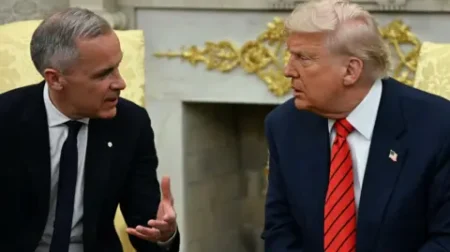On a recent Friday, former President Donald Trump declared an abrupt halt to trade negotiations with Canada, a decision he conveyed through his platform, Truth Social. This announcement has significant ramifications given that the trade discussions had been progressing for several months. The catalyst behind this sudden shift appears to be Canada’s proclamation of a digital service tax (DST), which Trump characterized as “a direct and blatant attack on our Country.” This assertion reflects Trump’s long-standing opposition to such taxes, which he sees as barriers to trade.
The ex-President’s comments were pointed and firm: “Based on this egregious Tax, we are hereby terminating ALL discussions on Trade with Canada, effective immediately.” He indicated that specifics concerning a new tariff rate would be communicated to Canada within a week. Trump’s sentiment arises from a broader debate concerning digital services taxes that various countries have introduced to tax online businesses. Such measures enable jurisdictions to collect revenue from large multinational corporations, many of which are based in the United States. Notably, American giants like Meta, Apple, Google, Amazon, and Microsoft are cited as being disproportionately affected by these taxes, which were analyzed comprehensively in a report by the nonpartisan Congressional Research Service.
Historically, Trump’s administration has been critical of DSTs, frequently dubbing them as “non-tariff trade barriers.” Canada’s implementation of this tax is particularly salient, as it is set to retroactively take effect from 2022, escalating tensions as the two nations navigate complex trade relations. The Commerce Department reports that Canada was the largest buyer of American goods in the previous year, importing approximately $349 billion, while exports of Canadian goods into the U.S. also exceeded substantial figures, totaling $413 billion.
The implications of Trump’s decision to impose higher tariffs on Canadians could lead to reciprocal actions from Canada, potentially spawning a trade war that may harm both economies. In light of these developments, Prime Minister Mark Carney’s office indicated that the Canadian government is assessing its response. Concurrently, Pierre Poilievre, leader of the Conservative Party in Canada, expressed disappointment in the halted trade talks and called for a recommencement of negotiations in his social media commentary.
The backdrop to this situation includes sentiments voiced by various Canadian businesses and trade groups that have been advocating against the new tax. They warn that such unilateral actions could exacerbate trade tensions with the United States, Canada’s principal trading partner. As Goldy Hyder, President and CEO of the Business Council of Canada, acknowledged, this unfortunate culmination was anticipated amidst warnings against implementing the DST. He emphasized the necessity for Canada to propose the elimination of the DST in exchange for the removal of U.S. tariffs to get trade negotiations back on track.
The dialogue escalates further with reflections from the Canadian Chamber of Commerce, which asserted that the DST is counterproductive and detrimental to Canada-U.S. relations. CEO Candace Laing pointed out that recent improvements in the tone of trade talks should not be overshadowed by the fallout from the new tax.
Historically, Trump’s presidency has seen threats of imposing a sweeping 25% tariff on Canadian exports. While many Canadian goods have dodged such tariffs due to the United States-Mexico-Canada Agreement (USMCA), exceptions apply, notably concerning vehicles and steel. Tariffs imposed by both governments in retaliation—Canada’s 25% on certain U.S. goods and the U.S.’s tariffs on steel and aluminum—highlight the risk of escalating trade disputes.
The urgency of the situation is underscored by a looming July 9 deadline for reciprocal tariffs, reflecting Trump’s ongoing strategy regarding trade negotiations with various countries. The uncertainty surrounding these potential tariff increases has already impacted the stock market, with the Dow Jones experiencing fluctuations following Trump’s announcement.
As the situation continues to evolve, the stakes remain high for both nations, emphasizing the delicate balance of international trade relations and the significant effects policy changes can have on economic partners.











